The EU battery passport solutions market is projected to grow from USD 1.1 billion in 2025 to approximately USD 6.2 billion by 2035, recording an absolute increase of USD 5.1 billion over the forecast period. This translates into a growth of 463.6% over the decade. The market is forecast to expand at a compound annual growth rate (CAGR) of 18.9%, with the overall market size projected to grow by nearly 5.6x by the end of the forecast period.
The battery passport solutions market in the EU is expanding rapidly due to the enforcement of the EU Battery Regulation (2023/1542), which requires all industrial, EV, and large batteries placed on the market to carry a digital passport. This mandate ensures traceability of raw materials, carbon footprint disclosure, recycled content reporting, and overall lifecycle transparency. Driven by the European Green Deal and circular economy goals, manufacturers and suppliers are adopting digital tools such as blockchain and IoT to comply, while also meeting growing investor and consumer demand for ethical sourcing and sustainability. This regulatory push fuels market growth.
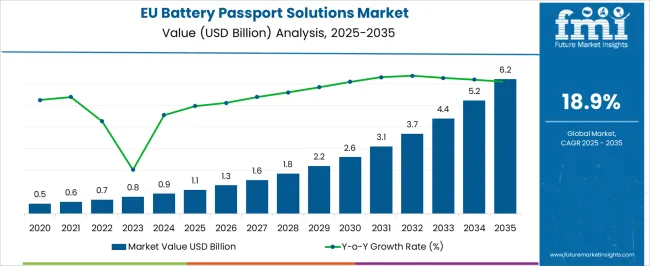
| Metric | Value |
|---|---|
| Industry Size (2025E) | USD 1.1 billion |
| Industry Value (2035F) | USD 6.2 billion |
| CAGR (2025 to 2035) | 18.9% |
From 2020 to 2024, the market rose from USD 0.2 billion to USD 1.1 billion, propelled by early regulatory announcements and pilot implementations of battery passport systems. The European Union's Battery Regulation framework catalyzed initial investment among major automotive and battery manufacturers. Advanced development programs by leading suppliers established the foundation for the 2025-2035 growth cycle.
Between 2025 and 2030, the market is projected to expand from USD 1.1 billion to USD 2.9 billion, adding approximately USD 1.8 billion. Growth in this first phase will be supported by mandatory EU Battery Regulation compliance requirements taking effect from 2027, driving systematic adoption across automotive OEMs and battery manufacturers. The implementation of digital product passports for industrial and EV batteries creates foundational demand for blockchain-based tracking and cloud registry platforms.
From 2030 to 2035, the market is expected to grow from USD 2.9 billion to USD 6.2 billion, a further increase of USD 3.3 billion. This second phase will be shaped by expanded applications in battery second-life management, enhanced circular economy integration, and advanced IoT-enabled digital twins for real-time battery monitoring. Technology refresh cycles will emphasize AI-powered analytics and automated compliance reporting, while regulatory developments will focus on harmonizing passport standards across global markets.
The EU Battery Regulation mandating digital product passports for industrial and EV batteries by 2027 creates compulsory implementation requirements for manufacturers, importers, and distributors. These regulations establish specific data disclosure requirements covering battery composition, performance metrics, carbon footprint, and supply chain traceability. Non-compliance results in market access restrictions, driving systematic adoption of passport solutions across the entire battery ecosystem.
Growing emphasis on battery recycling, second-life applications, and resource recovery is pushing companies to implement comprehensive lifecycle tracking capabilities. Battery passport solutions enable precise monitoring of material flows, performance degradation, and end-of-life processing, supporting circular economy objectives. This transparency facilitates efficient battery repurposing and recycling operations while demonstrating environmental stewardship to stakeholders.
Increasing scrutiny of battery supply chains, particularly regarding conflict minerals and forced labor, is driving demand for comprehensive traceability solutions. Battery passport systems provide auditable documentation of material sourcing, manufacturing processes, and labor practices throughout the supply chain. This transparency enables companies to manage reputational risks while meeting due diligence requirements and consumer expectations for ethical sourcing.
The market is segmented by technology platform into blockchain-based solutions, cloud/SaaS registry platforms, and IoT-enabled digital twins. By battery type coverage, the market includes EV traction batteries, industrial batteries, and portable batteries. Stakeholder application segments comprise OEM compliance & reporting, recycling & repurposing firms, and regulatory authorities & auditors. Regionally, the market covers major EU member states including Germany, France, Italy, Spain, Netherlands, Sweden, and Poland.
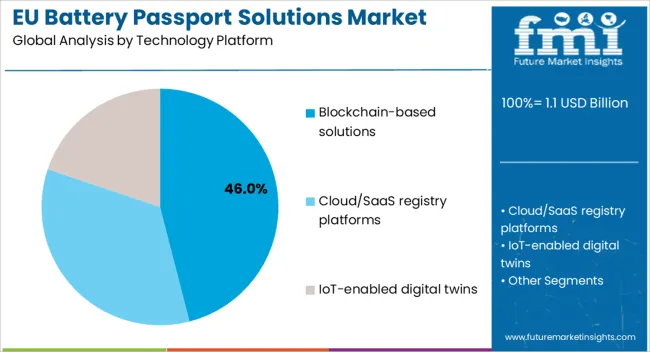
Blockchain-based solutions are projected to command a dominant 46% share of the EU battery passport solutions market by 2025, cementing their role as the preferred technology platform for regulatory compliance. Their superiority stems from immutable record-keeping capabilities that provide tamper-proof documentation of battery lifecycle data, from raw material sourcing through end-of-life processing. By creating distributed ledgers that cannot be altered retroactively, blockchain technology ensures the integrity and authenticity of passport data required by EU regulations.
The widespread adoption of blockchain solutions is driven by their ability to provide cryptographic security and decentralized verification, essential for maintaining trust among diverse stakeholders including manufacturers, recyclers, regulators, and consumers. Advanced blockchain platforms offer smart contract functionality that automates compliance reporting and enables real-time verification of regulatory requirements. Compared to traditional database approaches, blockchain provides enhanced transparency and auditability that regulators require while enabling secure data sharing across competitive supply chain participants. While cloud/SaaS and IoT solutions serve important complementary roles, blockchain's fundamental security and immutability characteristics position it as the cornerstone technology for EU battery passport implementation.
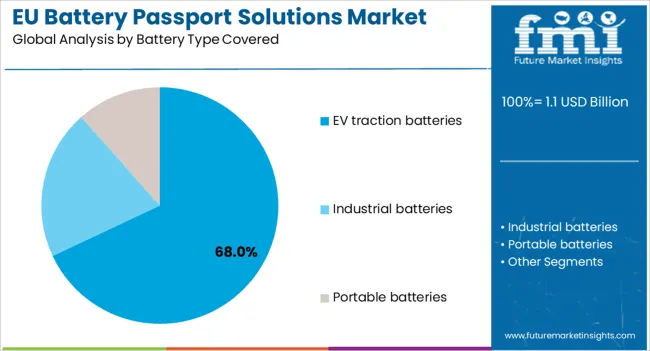
EV traction batteries are set to account for 68% of EU battery passport applications in 2025, reflecting their strategic importance in European automotive electrification and regulatory focus. These high-capacity battery packs represent the most valuable and environmentally significant segment, making comprehensive lifecycle tracking essential for regulatory compliance and circular economy objectives. The EU's specific focus on automotive applications drives stringent passport requirements covering carbon footprint disclosure, performance metrics, and end-of-life processing capabilities.
Industrial batteries represent 20% of applications, covering energy storage systems, backup power, and industrial equipment applications that increasingly fall under EU regulatory scope. Portable batteries account for 12% of the market, primarily covering consumer electronics and smaller device applications that will phase into passport requirements over time. The dominance of EV traction batteries reflects both regulatory priorities and economic value, as these systems require sophisticated tracking capabilities to support second-life applications, recycling optimization, and warranty management across multi-year vehicle lifecycles.
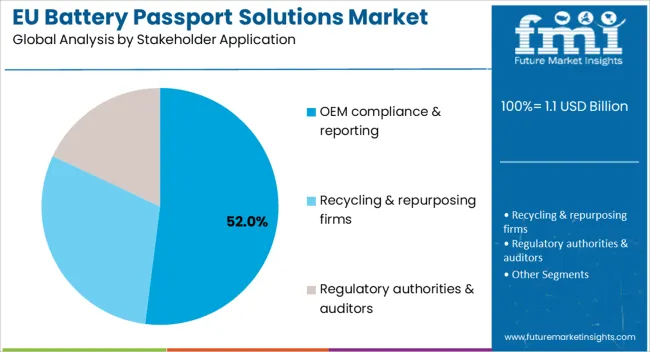
OEM compliance & reporting applications are forecasted to capture 52% of stakeholder segments in 2025, highlighting their critical role in implementing EU Battery Regulation requirements. Automotive and battery manufacturers must establish comprehensive passport systems to demonstrate regulatory compliance, manage supply chain risks, and enable market access across EU member states. These systems integrate with existing manufacturing execution systems and quality management platforms to automate passport data collection and regulatory reporting processes.
Recycling & repurposing firms represent 28% of applications, requiring passport data to optimize material recovery and enable efficient second-life battery applications. Regulatory authorities & auditors account for 20% of the market, using passport systems for compliance verification, market surveillance, and policy enforcement activities. The dominance of OEM applications reflects their position as data originators and primary compliance responsibility holders, while downstream stakeholders depend on passport information for operational and regulatory activities throughout the battery lifecycle.
Battery passport platforms are increasingly incorporating artificial intelligence and machine learning capabilities to analyze lifecycle data and generate actionable insights. These systems predict battery performance degradation, optimize second-life applications, and identify supply chain risks through pattern recognition and predictive analytics. AI enhancement enables proactive decision-making and automated compliance monitoring across complex battery ecosystems.
Advanced passport solutions integrate with IoT sensors and battery management systems to provide real-time performance data and environmental monitoring. This connectivity enables continuous passport updates throughout battery operational life, supporting predictive maintenance, warranty management, and accurate end-of-life value assessment. Real-time data collection enhances passport accuracy and enables dynamic compliance reporting.
Industry consortiums and standards organizations are developing common data formats and interface specifications to ensure passport system interoperability. These initiatives enable seamless data exchange between different platform providers and stakeholders, preventing vendor lock-in and supporting competitive market development. Standardization accelerates adoption by reducing implementation complexity and ensuring long-term system compatibility.
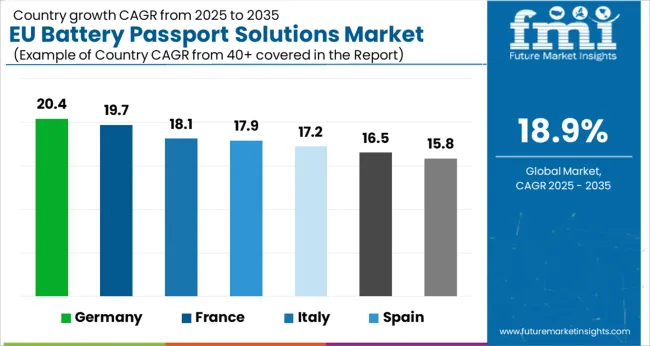
Germany's battery passport solutions market is projected to grow at 20.4% CAGR through 2035, the highest in the EU. The country's position as Europe's largest automotive producer and home to major EV battery manufacturing facilities creates substantial demand for comprehensive passport solutions. German automotive OEMs are implementing advanced blockchain-based systems to ensure compliance with EU regulations while maintaining competitive advantage through enhanced supply chain transparency.
French battery passport solutions market is expected to expand at 19.7% CAGR, supported by state-led initiatives promoting digital transformation in automotive and battery industries. The government's France 2030 investment program includes specific funding for battery passport infrastructure development. French battery manufacturers and automotive companies are leveraging government support to implement cutting-edge passport solutions that exceed minimum regulatory requirements.
Italy's battery passport solutions market is projected to grow at 18.1% CAGR, driven by expanding industrial battery applications and growing EV adoption. The country's strong manufacturing base in renewable energy storage and industrial equipment creates diverse demand for battery passport solutions. Italian companies are focusing on cost-effective passport implementations that support both regulatory compliance and operational optimization objectives.
Spain's battery passport solutions market is expected to grow at 17.9% CAGR, supported by major battery manufacturing investments and early adoption of passport pilot programs. The country's emergence as a European battery production hub, with facilities from companies like Volkswagen and CATL, creates substantial demand for integrated passport solutions. Spanish manufacturers are implementing passport systems as foundational infrastructure for their European operations.
The Netherlands battery passport solutions market is projected to expand at 17.2% CAGR, leveraging the country's position as a European logistics and recycling hub. Dutch companies are implementing comprehensive passport solutions that integrate battery tracking with broader circular economy and logistics operations. The country's advanced digital infrastructure and sustainability focus support sophisticated passport platform adoption.
Sweden's battery passport solutions market is expected to grow at 16.5% CAGR, led by Northvolt's integrated battery production and recycling operations. The company's commitment to sustainable battery production and closed-loop recycling creates demand for advanced passport solutions that support circular economy objectives. Swedish suppliers and partners are implementing complementary passport capabilities to support Northvolt's ecosystem requirements.
Poland's battery passport solutions market is projected to grow at 15.8% CAGR, driven by major EV battery manufacturing investments and systematic EU compliance integration. The country's growing role in European battery production, with facilities from companies like LG Energy Solution, creates consistent demand for passport solutions that integrate with broader manufacturing operations. Polish companies are focusing on cost-effective implementations that support both compliance and operational efficiency.
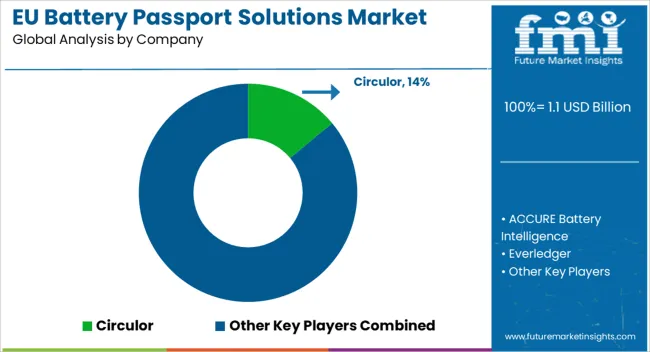
The EU battery passport solutions market is undergoing rapid development as regulatory, technological, and industry forces converge to reshape the sector. The introduction of the EU Battery Regulation has made digital product passports mandatory, compelling companies across the battery value chain to adopt systems that ensure traceability, transparency, and compliance. This regulatory push is creating a surge in demand for advanced digital solutions capable of managing complex supply chain data, verifying sustainability credentials, and supporting circular economy objectives.
Competition is intensifying as blockchain technology specialists, enterprise software providers, and battery-focused consultancies all seek to position themselves as trusted solution partners. Providers are differentiating their platforms through features such as robust data security, seamless interoperability among stakeholders, and scalability for global operations. Heavy investment is flowing into blockchain infrastructure, artificial intelligence-powered analytics, and IoT integration, reflecting the market’s focus on innovation and long-term reliability. The ability to combine regulatory compliance with operational efficiency is becoming the key determinant of market success.
Within this high-growth segment, Circulor is emerging as the clear market leader, projected to secure a 14% share by 2025. The company’s advantage lies in its established blockchain platform and its deep expertise in supply chain traceability. Circulor offers an integrated model that merges technical strength with specialized battery industry knowledge, compliance know-how, and an extensive network of partnerships. Its collaborations with major automotive OEMs and battery manufacturers provide credibility and ensure that its platform is aligned with industry needs. By addressing the dual imperatives of transparency and regulatory alignment, Circulor has built strong trust across the value chain.
| Item | Value |
|---|---|
| Quantitative Units | USD 1.1 billion |
| Technology Platform | Blockchain-based solutions, Cloud/SaaS registry platforms, IoT-enabled digital twins |
| Battery Type Coverage | EV traction batteries, Industrial batteries, Portable batteries |
| Stakeholder Application | OEM compliance & reporting, Recycling & repurposing firms, Regulatory authorities & auditors |
| Regions Covered | Germany, France, Italy, Spain, Netherlands, Sweden, Poland |
| Countries Covered | Germany, France, Italy, Spain, Netherlands, Sweden, Poland |
| Key Companies Profiled | Circulor, ACCURE Battery Intelligence, Everledger, Minespider, RCS Global, SAP, Siemens, CATL Europe, Northvolt, Veracity Protocol |
| Additional Attributes | Dollar sales by solution type and deployment model, regional adoption trends, competitive landscape, buyer preferences for cloud-based versus on-premises platforms, integration with regulatory compliance and ESG reporting, innovations in blockchain-enabled tracking, AI-driven analytics, lifecycle monitoring, interoperability standards, and secure data management for sustainable battery supply chains |
The EU battery passport solutions market is estimated to be valued at USD 1.1 billion in 2025.
The market size for the EU battery passport solutions market is projected to reach USD 6.2 billion by 2035.
The EU battery passport solutions market is expected to grow at a 18.9% CAGR between 2025 and 2035.
The key product types in EU battery passport solutions market are blockchain-based solutions, cloud/saas registry platforms and iot-enabled digital twins.
In terms of battery type covered, EV traction batteries segment to command 68.0% share in the EU battery passport solutions market in 2025.






Full Research Suite comprises of:
Market outlook & trends analysis
Interviews & case studies
Strategic recommendations
Vendor profiles & capabilities analysis
5-year forecasts
8 regions and 60+ country-level data splits
Market segment data splits
12 months of continuous data updates
DELIVERED AS:
PDF EXCEL ONLINE
Europe Radiotherapy Patient Positioning Market Size and Share Forecast Outlook 2025 to 2035
Europe Polyvinyl Alcohol Industry Analysis Size and Share Forecast Outlook 2025 to 2035
Europe Cruise Market Forecast and Outlook 2025 to 2035
Europium Market Forecast and Outlook 2025 to 2035
Eucommia Leaf Extract Market Size and Share Forecast Outlook 2025 to 2035
Europe Massage Therapy Service Market Size and Share Forecast Outlook 2025 to 2035
Europe Cement Market Analysis Size and Share Forecast Outlook 2025 to 2035
European Union Tourism Industry Size and Share Forecast Outlook 2025 to 2035
Europe Injection Molding Machines Market Size and Share Forecast Outlook 2025 to 2035
Europe Injection Moulders Market Size and Share Forecast Outlook 2025 to 2035
Europe and MENA Generic Oncology Drug Market Size and Share Forecast Outlook 2025 to 2035
Europe Masking Tapes Market Size and Share Forecast Outlook 2025 to 2035
Europe Liners Market Size and Share Forecast Outlook 2025 to 2035
Europe Dermal Fillers Market Size and Share Forecast Outlook 2025 to 2035
Europe Trolley Bus Market Size and Share Forecast Outlook 2025 to 2035
Europe Protease Market Size and Share Forecast Outlook 2025 to 2035
Europe Luxury Packaging Market Size and Share Forecast Outlook 2025 to 2035
Europe & USA Consumer Electronics Packaging Market Size and Share Forecast Outlook 2025 to 2035
Europe Plant-Based Meal Kit Market Size and Share Forecast Outlook 2025 to 2035
Europe Rubber Derived Unrefined Pyrolysis Oil Market Size and Share Forecast Outlook 2025 to 2035

Thank you!
You will receive an email from our Business Development Manager. Please be sure to check your SPAM/JUNK folder too.
Chat With
MaRIA